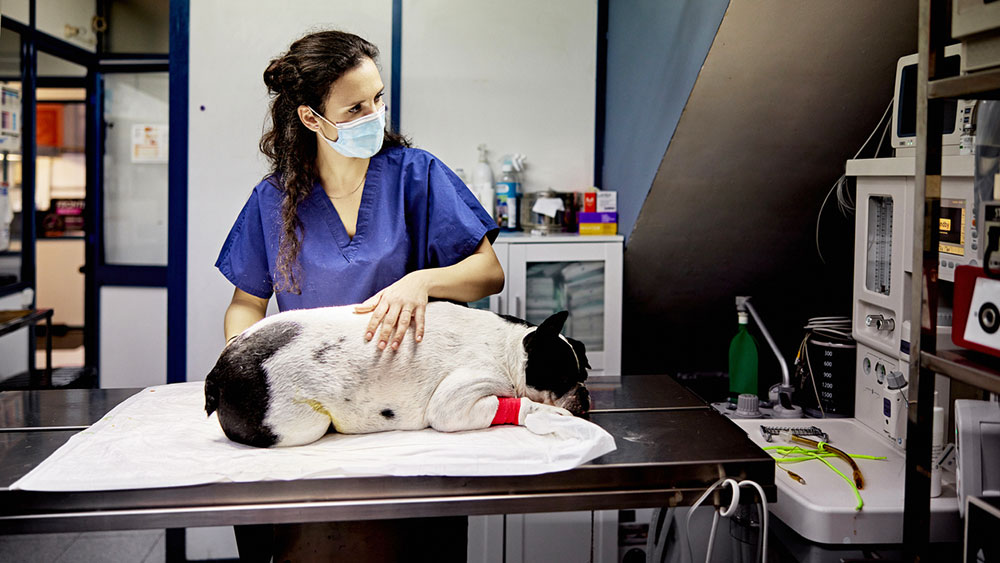Navigation auf uzh.ch
Navigation auf uzh.ch
If individual researchers wish to join forces with colleagues from other disciplines to form new units for joint cutting-edge research, they have to invest a great deal of time and find the necessary financial resources. UZH has now created the new funding instrument TRANSFORM with the aim of accelerating such bottom-up initiatives by researchers and structurally anchoring them in new or transformed organizational units. “With TRANSFORM, we want to respond quickly to new developments in the research landscape and promote sustainable collaboration in forward-looking areas,” says Elisabeth Stark, Vice President Research at the University of Zurich.
UZH is now launching the first two funding initiatives: the Center for Legal Data Science, based at the Faculty of Law, and the Institute of One Health Research, supported by the Vetsuisse Faculty, the Faculty of Medicine and the Faculty of Science.
“Both funding initiatives are unique in Switzerland and will advance the development of the entire university,” says Elisabeth Stark. The Institute of One Health Research links research-focused veterinary medicine, human medicine and natural sciences at UZH, while the Center for Legal Data Science fits perfectly into UZH’s digitalization strategy, complementing the activities of the Digital Society Initiative and the Digitalization Initiative of the Zurich Higher Education Institutions (DIZH).
The Institute of One Health Research and the Center for Legal Data Science will receive start-up funding totaling approximately CHF 2.7 million over the next four years.
Read on for a brief introduction to the two new research initiatives.

One Health is a holistic research approach which proceeds from the basic assumption that the health of humans, animals and the environment are interconnected and mutually dependent. The coronavirus pandemic highlighted the vital relevance of this approach: the pathogen originated in animals, jumped to humans, and is transmitted from humans back to animals.
With the growing prevalence of epidemics and pandemics and the rise of antibiotic-resistant germs, there is an urgent need for more global academic research in the area of One Health. Several scientists at the University of Zurich are already conducting One Health research – but not yet with a common strategy and agenda. This will now change with the launch of the Institute of One Health Research (IOHR).
“With the IOHR, we want to combine various research activities in a cross-faculty network and thus usher in a new era of One Health research in Switzerland. Thanks to the broad-based specialist knowledge from a wide range of disciplines, we can offer more holistic answers to new questions, and work much more efficiently,” says Adrian Hehl, professor of molecular parasitology, summarizing the added value of the new institute. Hehl is a co-initiator of the IOHR and developed the strategy together with veterinary professors Max Gassmann and Thomas Lutz.
It is planned that the IOHR will combine a wide range of research areas in the future, ranging from disease prevention and diagnosis to clinical aspects of human and animal diseases, and of course also basic research. Initially, research at the IOHR will focus on three key One Health areas: zoonoses, drug resistance and integrated approaches to metabolic disease research in humans and animals. The intersecting disciplines of epidemiology and evolutionary science have a crucial role to play here. The first research projects are planned to start next year – once the new institute is fully up and running.
Two assistant professorships will be created at the IOHR within the next year. The assistant professors will lead the research activities, and together with their teams as well as several affiliated scholars from partner institutes, they will organize the work of the IOHR at the start. It is planned that the institute will have its own laboratories and offices on Irchel Campus.
The IOHR will offer courses in medical subjects as part of the regular university curriculum as well as special courses and seminars for doctoral students. In addition, during the four-year funding period, a transdisciplinary Master’s degree program will be created for students with a Bachelor’s degree in a life sciences subject.

The new discipline of legal data science involves computer-aided systematic collection, processing and evaluation of legal data – for example, rulings, contracts or statutes. The use of quantitative methods in legal studies complements text-based work and ultimately contributes to better quality – tested – legal statements and decisions.
With the ever-increasing availability of data, quantitative legal research will become even more important in the future. Quantitative skills in statistics and computer science are also increasingly in demand in traditional fields of law and the legal profession.
While quantitative legal research has already gained a foothold in the USA, it is still in its infancy in Europe, in Switzerland and also at the University of Zurich. “With the Center for Legal Data Science, we want to form an interdisciplinary scientific network to build up skills and strengthen quantitative legal research, initially within the Faculty of Law,” explains Thomas Gächter, dean of the Faculty of Law, who will also act as scientific advisor for the center.
The distinctive feature of the Center for Legal Data Science (CLDS) is that it will not initially establish concrete research focus areas, but rather puts the emphasis on the scientific methods. “The core tasks are the academic dissemination, application, critical reflection and promotion of data science methods in national and international legal contexts,” says Tilmann Altwicker, professor of public law, international law, philosophy of law, and empirical legal research. He will play a central role in the CLDS as chair of the executive committee, as well as conducting his own research projects at the center.
In addition to carrying out innovative research at the intersection of law and data science, the mission of the CLDS is to disseminate findings in quantitative legal research within the Faculty of Law and to provide advice and assistance to interested faculty colleagues. A variety of courses are planned at Bachelor’s and Master’s levels for students to acquire quantitative methodological skills – including statistics, programming and data law. A continuing education program – a CAS in Legal Data Science – is also planned, aimed at junior researchers, practicing lawyers, court clerks, judges or administrators.